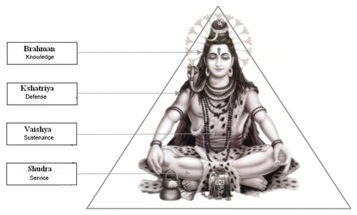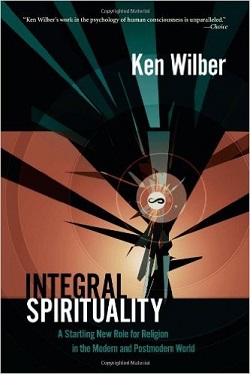TRANSLATE THIS ARTICLE
Integral World: Exploring Theories of Everything
An independent forum for a critical discussion of the integral philosophy of Ken Wilber
 David Christopher Lane David Christopher Lane, Ph.D.
Professor of Philosophy, Mt. San Antonio College Lecturer in Religious Studies, California State University, Long Beach Author of Exposing Cults: When the Skeptical Mind Confronts the Mystical (New York and London: Garland Publishers, 1994) and The Radhasoami Tradition: A Critical History of Guru Succession (New York and London: Garland Publishers, 1992). SEE MORE ESSAYS WRITTEN BY DAVID LANE
Integral Apartheid
Ken Wilber's Cousins, Color-Coding,
and the Nazi Problem
David Lane

While eating my typical breakfast of Nature's Path Heritage Flakes with Westbrae's Soy milk, I was re-reading Ken Wilber's 2006 book, Integral Spirituality: A Startling New Role for Religion in the Modern and Postmodern World, and when I got to page 179 I had to put my spoon down because I was laughing so hard. In explaining how the majority of the earth's population is caught in the “ethnocentric or lower levels of development,” Wilber summarizes his questionable statistic with a line straight out of Donald Trump's lexicon,
“To put it in the bluntest terms possible, this means around 70% of the world's population is Nazis.” (p. 179)
Now this particular line wasn't what got me laughing out loud, but what Wilber said a few sentences later where he cautioned,
“And please, no politically correct tsk-tsking here. I'm talking about some of my best friends and most of my family (certainly all of the cousins).” (p. 179)
I have to admit, even though I have been a harsh critic of some of Wilber's ideas (particularly his misrepresentation of evolution and his fawning praise of vainglorious gurus such as Adi Da and Andrew Cohen), I do commend him for his willingness to go out on a limb, to crib the title of Shirley MacLaine's 1983, paranormal filled autobiography.
By doing such, it makes it easier to pinpoint once again some of Ken Wilber's major intellectual weaknesses, including his persistent tendency for hyperbole, misuse of statistics, and color-coded stereotyping. Now to be fair, I don't know Wilber's cousins (are we talking first and second only?), so maybe he is privy to their reading material and other habits. Mein Kampf prominently displayed on the fire mantle piece along with photographs of Eva Braun?
While I can readily appreciate that there are different levels of moral and cognitive growth in the human population and that our religions reflect varying stages of consciousness (see Wilber's A Sociable God), is Wilber's pernicious habit of numbered grouping, name calling, and color labeling really a progressive and informative way to genuinely understand the cosmos and our place within it?
Does Wilber want his all quadrants, levels, lines, states, and types reduced to a catchy meme such as Integral Apartheid? I think not. Wilber rails against scientific materialism and myopic reductionism, but in the process naively indulges in his own New Age form of it by repeatedly reducing a set of people and a set of ideas to a hierarchical potpourri of color-coding. Thus in Wilber's schema, instead of patiently and exhaustively engaging an argument at each turn, he resorts to chroma casting in such generalist and dismissive terms that essential nuances get lost in his premature labeling.
Reducing complex human intention and behavior to amber, red, or orange, etc., may be fun and an easy way to catalog variations along a spectrum, but it is dangerously lazy. It is also a form of reductionism par excellence, despite it protestations to the contrary.
Wilber rails against scientific materialism and myopic reductionism, but in the process naively indulges in his own New Age form of it.
Wilber alleges that in doing research for The Many Faces of Terrorism[1] he noticed that terrorist acts around the globe (he claims to have looked at 50 or so) “had the same basic psychograph: amber beliefs with red self.” (p. 180-181) Such color-coding may on the surface appear instructive, but this very lumping fails to provide the necessary contextual and individual information necessary to properly understand the variances amongst those committing such acts. Alleging someone is talking amber and acting red is classic stereotyping and in so doing actually cuts off a deeper investigation since it gives one the illusory sense of “knowing” what is happening. Wilber's chroma casting is a shorthand way of “moving on” and not looking at the odd sequence that doesn't fit into the preset model. We have already seen him do this repeatedly with his misrepresentations of evolutionary biology and his over-the-top appraisements of such nefarious teachers as Marc Gafni where he looks askance at those actions that don't dovetail with his earlier panegyric. Just take Andrew Cohen as one very telling instance. Wilber put his credentials on the line indulging and praising this self styled guru to the hilt, but when Andrew Cohen was shown to be much less than advertised, we hear basically nothing but silence from Wilber on it.
Richard Feynman captures well the “naming” mistake when he writes,
“You can know the name of a bird in all the languages of the world, but when you're finished, you'll know absolutely nothing whatever about the bird. So let's look at the bird and see what it's doing -- that's what counts. I learned very early the difference between knowing the name of something and knowing something.”
Wilber is caught by this mandalic temptation where in a rush to fit everything in his Integral Map, he skips over the very information that doesn't fit neat and tight in his preset understanding. Life is messier than his Integral theory lets on, particularly when certain facts upturn his own cherished ideals. The real danger underlying all this is reification, where we make our abstractions into concretized “things”, is that we end up discussing generalizations and not the particulars that are invariably the exception.
For example, Wilber conjoins Sikh terrorists of the Punjab and Muslim terrorists, wrongly claiming that both view suicide “as a career promotion.” (p. 181) As the BBC website on Sikhism explains, “Sikh Gurus rejected suicide (and by extension, euthanasia) as an interference in God's plan. Suffering, they said, was part of the operation of karma, and human beings should not only accept it without complaint but act so as to make the best of the situation that karma has given them.”
Because he neglects to cite specifics, the reader is left with the wrong impression about what may or may not have motivated such actions in the first place. Details, details, and more details are elemental here, and while Wilber castigates scientific materialism for “eating” brain studies “alive” (p. 165) (since the “spirit is nothing but the brain!”), he does something quite similar when he reduces human motivation and action in his own ad hoc, idiosyncratic (and partially borrowed) color schema. Yes, these scaffolding projects can be helpful at times, but only if they serve for deeper and rich investigations that have the potential of upturning the very models they are predicated upon.
Calling seventy percent of the world's population Nazis doesn't progress the Integral conversation so much as unnecessarily sink it to sloganeering. Color coding groups of people has a long history, dating back to the varnas in India, where classes of people were socially stratified into four major divisions:
- The Brahmins: priests, scholars and teachers.
- The Kshatriyas: rulers, warriors and administrators.
- The Vaishyas: cattle herders, agriculturists, artisans and merchants.
- The Shudras: laborers and service providers.
Interestingly (or should I say “revealingly”?), the word varna in the Vedas and in the Mahabharata refers also to “color.” We have already seen how insidious color-coding has been when referring to race. Is it really that enlightening when employed in today's post-modern context relating to levels of consciousness, particularly when it is used as a form of intellectual leveling (or worse, a not so subtle cognitive put-down)?

I remember in my undergraduate days when friends of mine would take an introductory course in psychology and learn the rudiments of Freud's theory of psycho-social development and with their new found vocabulary proceed to pigeon-hole all sorts of varied characteristics with Freudian terminology, diminishing us as merely repressed sexual beings regardless of context. I have noticed something similar happening when my college students in my critical thinking classes learn about logical fallacies, which they tend to overuse and often mistakenly believe they are refuting an argument when, on a closer inspection, they have succumbed to what is sometimes known as the “labeling fallacy” or more simply understood as “putting the cart before the horse.”
I enjoy Ken Wilber's evolving efforts to map the cosmos with his ever-encompassing holonic repertoire, but perhaps the oft-used idiom, “God is in the details” should be placed front and center in Integral thinking. Otherwise, if we follow Wilber's lead, we succumb to Trump-like sound bites where “orange is the new black” (oops, I meant to say “teal is the new red”?), where “Republicans are frozen amber” (or is that merely Bob Dole?), where “Andrew Cohen is a Rude Boy” (but neglecting to point out how abusive he was), or where one's cousins (without distinguishing any of them) are Nazis. This isn't Integral thinking; it is a cheap form of cerebral stamping.
Or perhaps Wilber wants to develop his own new line of Hallmark greeting cards for parents celebrating the birth of their son or daughter with a direct quote from his book on Integral Spirituality:
“Every time somebody somewhere has sex, they are producing a fresh supply of Nazis” (p. 180)
-0-0-0-0-0-

Notes
[1] This book The Many Faces of Terrorism never got published, but several chapters can be read online at Ken Wilber's personal website www.kenwilber.com. It is written in the same quasi-novelist style as Boomeritis. It is because of this literary format, that Ken Wilber's ideas on terrorism and politics have never reached the audience they deserve (FV):
|
 David Christopher Lane, Ph.D.
Professor of Philosophy, Mt. San Antonio College Lecturer in Religious Studies, California State University, Long Beach Author of Exposing Cults: When the Skeptical Mind Confronts the Mystical (New York and London: Garland Publishers, 1994) and The Radhasoami Tradition: A Critical History of Guru Succession (New York and London: Garland Publishers, 1992).
David Christopher Lane, Ph.D.
Professor of Philosophy, Mt. San Antonio College Lecturer in Religious Studies, California State University, Long Beach Author of Exposing Cults: When the Skeptical Mind Confronts the Mystical (New York and London: Garland Publishers, 1994) and The Radhasoami Tradition: A Critical History of Guru Succession (New York and London: Garland Publishers, 1992).


